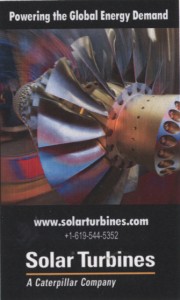
Headquartered in San Diego, California, USA, Solar Turbines Incorporated, a subsidiary of Caterpillar Inc., is one of the world’s leading manufacturers of industrial gas turbines, with more than 14,500 units and over 2 billion operating hours in 100 countries.
Products from Solar Turbines play an important role in the development of oil, natural gas and power generation projects around the world. Solar Turbines’ products include gas turbine engines (rated from 1590 to 30,000 horsepower), gas compressors, and gas turbine-powered compressor sets, mechanical-drive packages and generator sets (ranging from 1.1 to 22 megawatts).
Solar’s customers put the company’s products to work in many areas including production, processing and pipeline transmission of natural gas and crude oil and generation of electricity and thermal energy for processing applications, such as manufacturing chemicals, pharmaceuticals, and food products.
Solar’s foundation is people and Solar’s culture is one where individual contributions are valued, diversity in the workplace is encouraged, and safety is emphasized in all aspects of the business. Solar Turbines is comprised of a dedicated and multi-talented workforce of more than 7,000 employees with decades of experience working as a global team.
Products and Services
Products include six gas turbine product families, Saturn®, Centaur®, Mercury™, Taurus™, Mars®, Titan™, and 10 centrifugal gas compressor product families including both pipeline and production compressors. Gas Turbine Products range from 1-22 MW (1500-30,000hp). Solar also manufacturesTurbotronic™ microprocessor-based control systems utilizing PLC technology. Services offered by the Company cover gas turbine and gas compressor overhaul, parts replacement, field service, package refurbishment, and asset management.
Solar sells, manufactures, and services its products from over 30 worldwide locations. Business is conducted through these offices with sales and service employees plus sales representatives and selected distributors. Although 80% of Solar’s employees and 85% of the physical assets are located in the U.S., Solar exports more than 70% of its products. Solar is one of the 50 largest exporters in the United States.
Markets
Solar participates in two major market segments:
– Oil and Gas Production and Transmission (O&G),
– Power Generation (PG)
An essential requirement for market success is operating effectively in every global region. Solar is a domestic company competing and winning internationally through a marketing strategy of deploying processes within the culture of the region. By placing people in specific geographic areas and driving decisions down to their locale, Solar is able to operate effectively within the common practices of the region.
Customer Support
Another important requirement for market success is providing the necessary after-sales service and support in any global location. Because gas turbine installations operate for decades, service for the life of the product, overhaul, and refurbishment are critical components of market success.
Social Responsibility
All of Solar’s facilities place high priority on environmental health and safety performance. High priority areas include Pollution Prevention and Waste Reduction and many of Solar’s facilities have received awards for safety and environmental management.
Emission standards are becoming increasingly more stringent worldwide and are a core customer requirement. Offering low-emissions products provide a competitive advantage. Solar maintains a leadership position with itsSoLoNOx™ dry-emission technology that significantly reduces nitrogen oxide emissions, a contributor to smog. Solar’s effectiveness in providing new pollution-prevention technology into the marketplace was confirmed through a Department of Energy (DOE) grant to develop the next generation of high-efficiency, low-emission industrial gas turbines.
Supplier and Partnership Relationships
Suppliers are classified into three categories: approved, certified, and partners. Suppliers undergo a rigorous process to achieve these ratings, including an 18-point process-control assessment that addresses material and documentation control, personnel selection and training, quality management, and continuous improvement approach. Annual quality, cost, and cycle-time reduction goals are established and monitored and direct point-of-use deliveries provide both Solar and these suppliers with quality and cost benefits.
Supplier partnerships exist where there is a critical dependency on supplier technology, part performance, and/or part lead times. A few select partners have demonstrated the highest quality and performance standards, participated in shared risk-taking, and assigned people in Solar’s facilities to participate on new product development teams.
Solar’s supplier strategy is to optimize the number of suppliers by basing selection on core competencies, value added, and dedication to continuous improvement. Solar’s Supplier Quality Management System (SQMS) provides suppliers with monthly status of their delivery and quality performance. Solar hosts Supplier Symposiums and training to strengthen relationships. Solar has special practices in place to manage and protect its small, disadvantaged suppliers.
